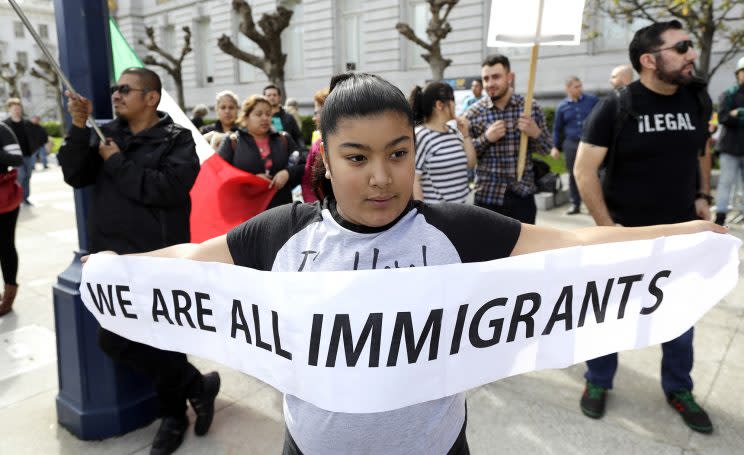Immigration advocates denounce DHS plan to implement Trump executive orders

Immigration policy experts lashed out Tuesday at the Department of Homeland Security’s plan to implement President Trump’s executive orders on immigration.
“In my many years of practicing immigration law, I have not seen a mass deportation blueprint like this one,” Marielena Hincapié, executive director of the National Immigration Law Center, a Los Angeles-based nonprofit that advocates for the rights of low-income immigrant families, said in a conference call with reporters.
In two memos issued Tuesday, DHS Secretary John Kelly laid out sweeping new guidance for officers tasked with carrying out the president’s immigration policies. Those directives included a push to arrest, detain and deport a significantly broader pool of undocumented immigrants.
Hincapié, who called the memos “breathtaking in scope,” was one of several experts in immigration policy and law who offered analysis of what she called the memos’ “most chilling details.”
Chief among them was Kelly’s declaration that, while convicted criminals will remain a top priority for deportation, “the Department no longer will exempt classes or categories of removable aliens from potential enforcement.” In other words, virtually all undocumented immigrants — including those previously given a pass under an Obama administration directive that prioritized deportations of violent criminals, known gang members, and others deemed a threat to public and national security — may now be subject to deportation.
“Everyone is a priority,” Hincapié argued. “These memos run counter to the rule of law,” she added, and their implementation “would wreak havoc on our economy, our families and our communities.”
Tom Jawetz, vice president of immigration at the Center for American Progress, a liberal think tank, agreed.
“The dragnet represented by having a priority-free immigration policy is going to be massive,” he predicted, noting that the DHS memos also include a provision for the reinstatement and expansion of Secure Communities. A George W. Bush-era program that was dismantled under the Obama administration, Secure Communities enables local law enforcement agencies to assist Immigration and Customs Enforcement agents in identifying, arresting and detaining undocumented immigrants.
Jawetz warned that the return of Secure Communities combined with elimination of enforcement priorities will “cause chaos and confusion throughout law enforcement agencies around the country” and “essentially reward jurisdictions that have a history of racial profiling.”
Kelly, in contrast, argues that federal authorities need all the help they can get.
“The surge of immigration at the southern border has overwhelmed federal agencies and resources and has created a significant national security vulnerability to the United States,” he wrote in the memos, pointing to an increase in apprehensions along the southwest border from 2015 to 2016.

Jawetz also expressed concern about a provision in the memos that moves to expand the expedited removal process that allows officials to deport certain undocumented immigrants without first putting them through court proceedings.
Expedited removal is currently reserved for people caught within 100 miles of the U.S. border less than 14 days after they first entered the country. Under the new DHS guidance, that process could be expanded to include any undocumented person apprehended anywhere within the U.S. who cannot prove that he or she has been in the country for more than two years, Jawetz said.
Undocumented immigrants not subject to expedited removal will be subject to detention for the duration of their deportation proceedings, unlike with the current policy, which allows for release and an order to appear at a later court hearing, according to the DHS memos.
The memos also call for the construction of additional detention facilities along the southwest border to accommodate the inevitable influx of immigrants jailed under the new policies.
Jawetz predicted that Congress will start to receive supplemental border requests over the next couple of months to pay for the new jails as well as the construction of a border wall between the U.S. and Mexico and the hiring of 10,000 immigration officers.
“We’ll see how many tens of millions of dollars [Republicans] are willing to allocate to accomplish this mass deportation agenda,” Jawetz said.
According to the memos, DHS will also seek to stem the flow of undocumented minors from Central America by threatening prosecution for anyone who “directly or indirectly facilitates the illegal smuggling or trafficking of an alien child into the United States.”
“This is really painful,” said Jen Smyers, associate director for immigration and refugee policy for Church World Service. The memo, she argues, “drastically distorts terms like ‘smuggling’ and ‘trafficking’” and casts parents who send money to help children escape dangerous situations in places like Honduras and El Salvador as “conspiring to violate immigration laws.”
As the new policies begin to take effect, Hincapié and others said they expect to see a continuation of immigration raids resulting in more people being detained at home, work and even such “sensitive locations” as hospitals, schools, or places of worship, where enforcement operations have been discouraged under existing ICE policy.
Eight hundred congregations have recently joined the sanctuary movement nationwide, Smyers said, volunteering to provide shelter to people in fear of deportation.
For now, Hincapié and the others said they are trying to figure out which of the memos’ provisions can be challenged through legal action, while also encouraging people to petition their representatives to Congress to push back against the executive orders.
“I am confident that our country is better than this and we will prevail,” said Hincapié. “But this is a dangerous time that requires all of us to fight back against these policies.”
Read more from Yahoo News:


